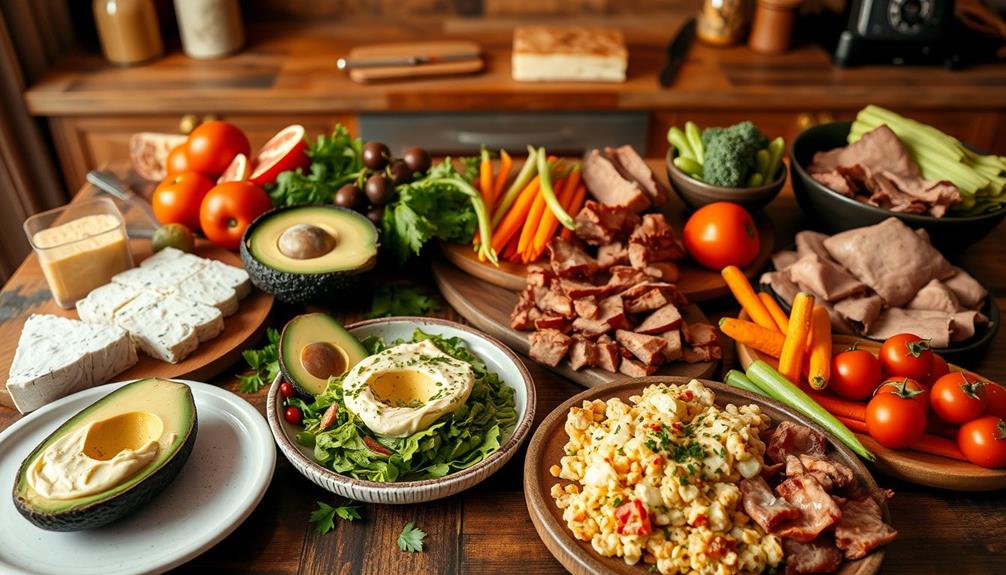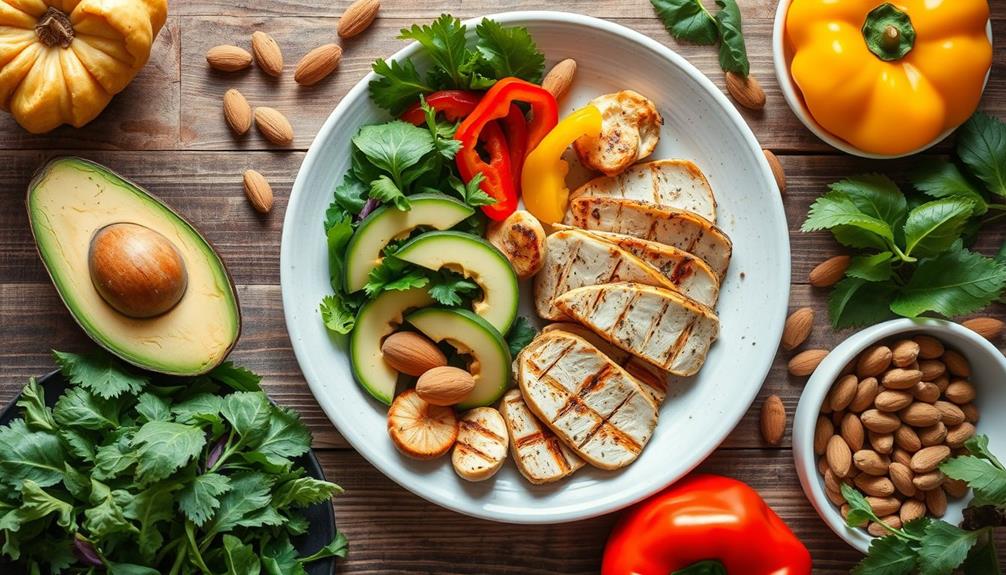Mastering nutrient balance on a keto diet is essential for your success and health. Start by limiting carbs to 20-50 grams and boosting fat intake to 70-80% of your calories. Include high-quality fats like avocados and nuts, while also eating moderate proteins from sources like poultry and dairy. Don't forget to monitor your electrolytes—aim for adequate sodium, potassium, and magnesium to stay balanced. Incorporating low-carb vegetables can help you avoid digestive issues. Planning meals and tracking your intake will set you up for success. There's even more to explore about maintaining your keto journey effectively. As you navigate your keto journey, be sure to keep up with your nutrient balance tips to ensure that you are meeting your body’s needs. Pay attention to your body’s signals and adjust your nutrient intake accordingly. Don’t hesitate to seek guidance from a healthcare professional or nutritionist to ensure that you are on the right track with your nutrient balance.
Key Takeaways
- Track your macronutrient intake to ensure you meet fat, protein, and carbohydrate targets effectively.
- Incorporate a variety of high-quality fats, such as avocados, nuts, and oils, for optimal nutrient absorption.
- Include low-carb, nutrient-dense vegetables to enhance fiber intake and prevent digestive issues.
- Stay hydrated and monitor electrolytes, focusing on sodium, potassium, and magnesium to maintain balance.
- Plan and prep meals in advance to avoid hidden carbs and ensure nutrient diversity throughout the week.
Understanding the Keto Diet
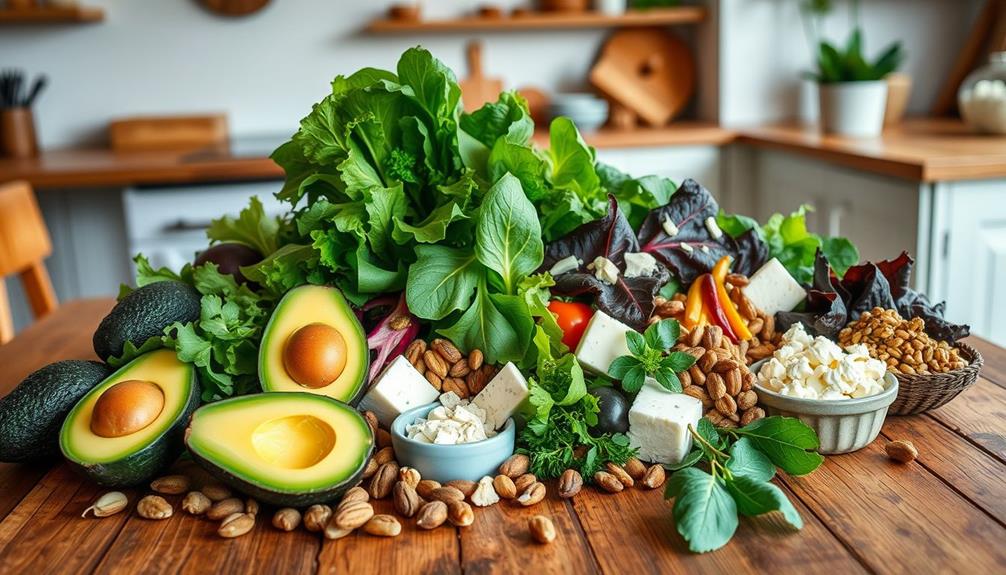
To truly grasp the keto diet, it's vital to understand its core principles. This dietary approach focuses on markedly reducing your carbohydrate intake, generally to 20-50 grams daily, while increasing your fat consumption to about 70-80% of your total calories.
By doing this, you aim to enter a state of ketosis, where your body efficiently burns fat for energy instead of carbs. You'll be choosing high-quality fats like avocados, nuts, and oils, along with moderate protein sources such as poultry and dairy.
Mastering these macronutrient ratios is essential for effective weight loss and improved overall health. By prioritizing these guidelines, you'll set a strong foundation for your keto journey and maximize its benefits.
Quality Over Quantity in Nutrition
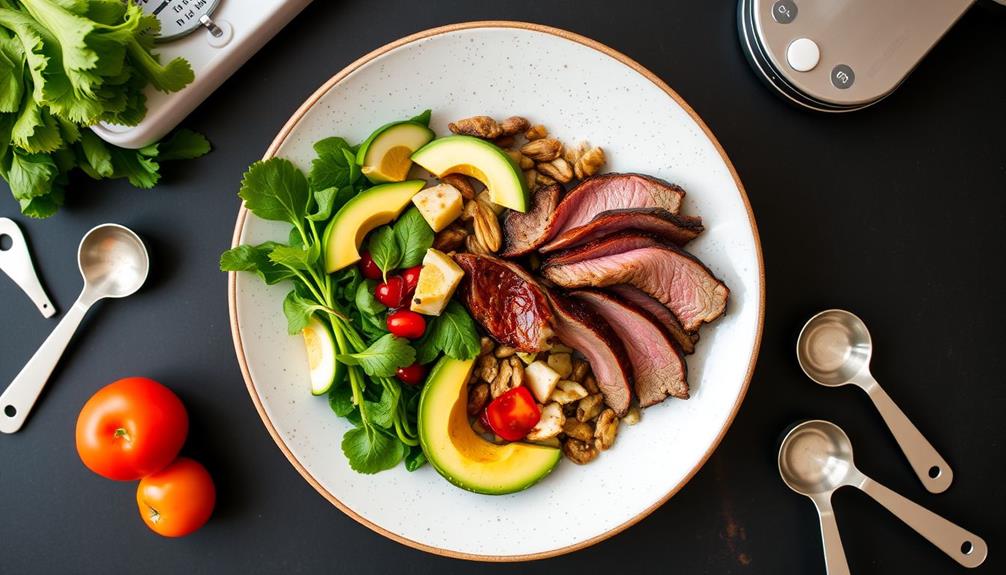
While many people focus solely on calorie counts when following a diet, the quality of the nutrients you consume plays an essential role in your overall health and success on the keto diet.
Instead of obsessing over numbers, prioritize nutrient-dense foods that provide essential vitamins and minerals. Incorporate high-quality fats like avocados and olive oil, which not only keep you full but also support heart health.
Choose grass-fed meats and wild-caught fish for their superior nutrient profiles. This focus on quality helps prevent deficiencies and supports sustained energy levels.
Managing Electrolytes Effectively
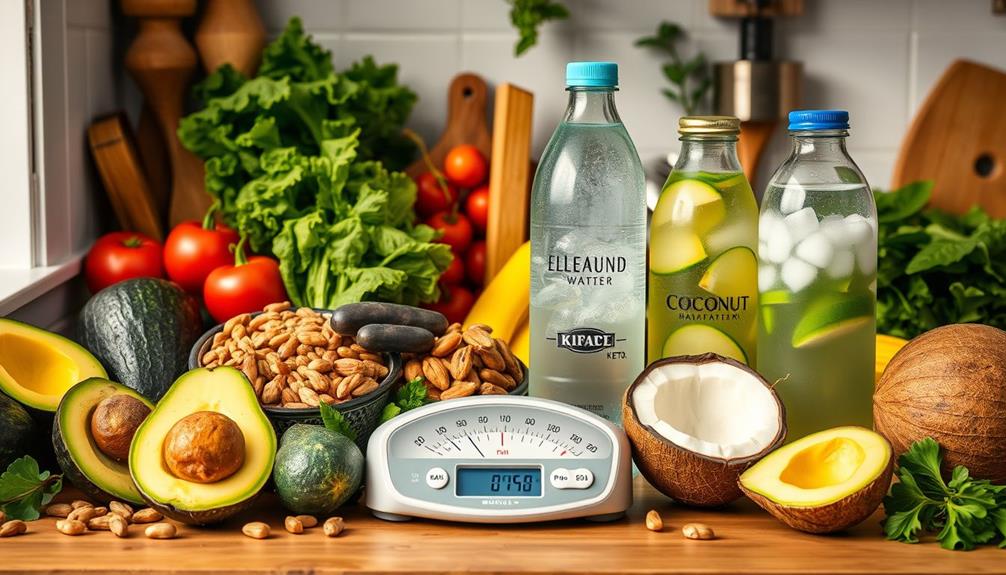
Managing electrolytes effectively is essential when following a ketogenic diet, especially as your body adapts to ketosis. Monitoring your sodium, potassium, and magnesium levels will help prevent fatigue, cramps, and other imbalances. To maintain ideal electrolyte levels, incorporate the following foods into your meals:
| Electrolyte | Food Sources | Recommended Daily Intake |
|---|---|---|
| Sodium | Sea salt, broth | 2,300 mg |
| Potassium | Avocados, leafy greens | 4,700 mg |
| Magnesium | Nuts, seeds, dark chocolate | 400 mg |
Consider supplementing if you struggle to get enough from food. Always stay hydrated, as proper water intake supports overall electrolyte balance, making your keto journey smoother and more enjoyable.
Common Nutritional Pitfalls

Many people encounter common nutritional pitfalls when following a ketogenic diet, which can hinder their progress and overall well-being.
One major issue is insufficient fiber intake, often due to a lack of low-carb vegetables. This can lead to digestive problems and nutrient deficiencies.
Overeating protein is another mistake; it can kick you out of ketosis by triggering gluconeogenesis, causing weight gain.
Staying hydrated is essential, too, as dehydration affects your electrolyte balance.
Finally, hidden carbohydrates in processed foods can sneak into your diet, derailing your efforts to maintain low carb intake.
Being aware of these pitfalls can help you stay on track and achieve your keto goals effectively.
Tips for Nutrient Balancing
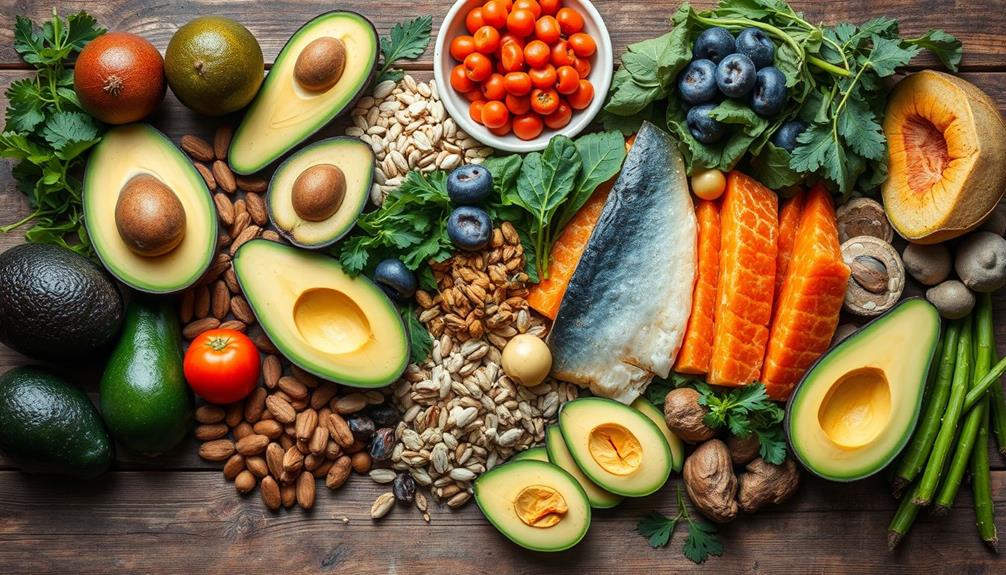
Achieving nutrient balance on a keto diet requires intentional planning and smart choices.
To keep your body functioning at its best while enjoying the benefits of ketosis, follow these tips:
1. Track Your Macros: Use a food diary or app to monitor your daily intake of fats, proteins, and carbs, ensuring you stay within your target ranges.
This practice is essential for managing insulin resistance and enhancing your health.
2. Diversify Your Fat Sources: Incorporate healthy fats like avocados, nuts, and olive oil to provide a range of essential fatty acids.
3. Eat Low-Carb Vegetables: Fill your plate with leafy greens and cruciferous veggies to boost fiber and micronutrient intake.
4. Stay Hydrated: Drink plenty of water to help maintain electrolyte balance and support overall health.
Meal Planning for Success
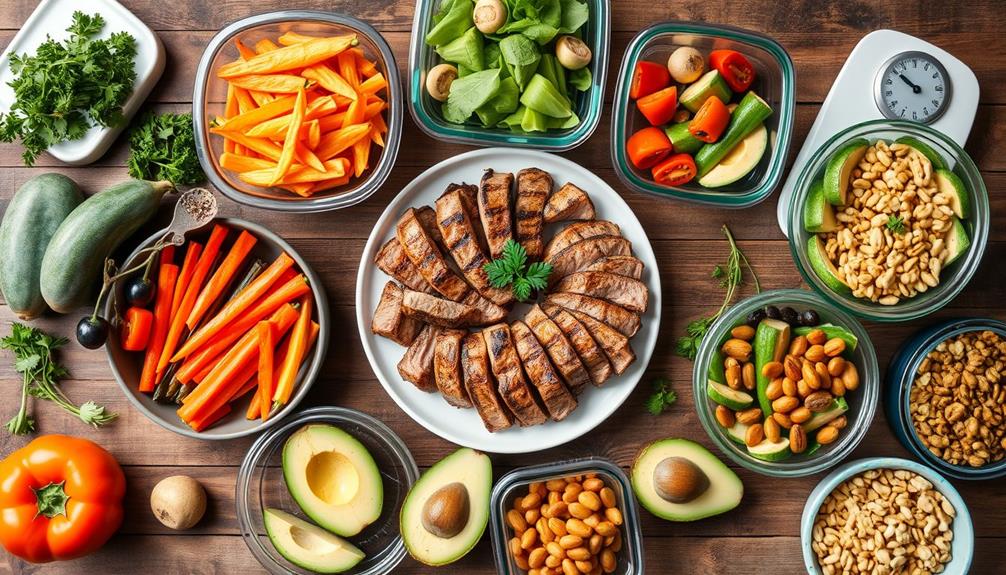
Effective meal planning is a game-changer for anyone on the keto diet. By organizing your meals in advance, you can guarantee you're hitting your macronutrient targets while keeping your meals interesting.
Start by creating a weekly menu that includes a variety of high-fat, low-carb foods like avocados, nuts, and fatty fish. Prep your meals in batches to save time during busy days, and portion them out to avoid overeating.
Don't forget to incorporate low-carb vegetables for fiber and essential nutrients. Keep snacks handy, like cheese or olives, to help you stay on track.
Long-term Health Considerations
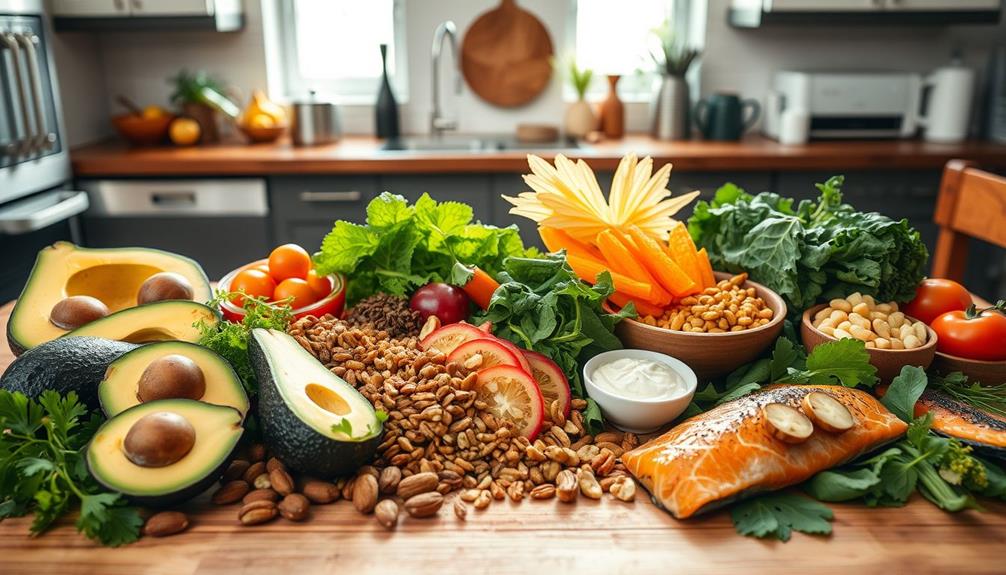
Considering the long-term implications of the keto diet is essential for maintaining ideal health. While you may experience weight loss and improved energy levels initially, it's vital to monitor your overall well-being.
Here are some key considerations:
- Nutrient Deficiencies: Make sure you're consuming a variety of foods to avoid deficiencies in vitamins and minerals.
- Heart Health: Focus on healthy fats, as excessive saturated fats can affect cholesterol levels negatively.
- Bone Health: Maintain adequate calcium and magnesium intake to support bone density.
- Kidney Function: Pay attention to protein intake, as high levels may stress your kidneys over time.
Frequently Asked Questions
Can I Eat Fruit on a Ketogenic Diet?
You can eat some fruits on a ketogenic diet, but focus on low-carb options like berries. Limit portion sizes to stay within your daily carb allowance and maintain ketosis effectively while enjoying these tasty treats.
How Do I Know if I'm in Ketosis?
To know if you're in ketosis, monitor your body for signs like increased energy, reduced appetite, or bad breath. You can also use ketone test strips or a blood ketone meter for precise measurement.
What Snacks Are Keto-Friendly?
When choosing keto-friendly snacks, opt for high-fat options like cheese, nuts, olives, or avocados. You can also enjoy hard-boiled eggs or pork rinds. Just keep an eye on portion sizes to maintain your carb limit.
Is Intermittent Fasting Compatible With Keto?
Yes, intermittent fasting's compatible with keto! You can enhance fat burning and improve metabolic flexibility. Just confirm you're still meeting your nutrient needs during eating windows to support overall health and energy levels.
Can I Drink Alcohol on a Keto Diet?
Sure, you can drink alcohol on keto—just remember, it's not your average party! Opt for low-carb options like spirits or dry wine, but watch your intake; those hidden carbs can sneak up on you.
Conclusion
Mastering nutrient balance on the keto diet is like tuning a fine instrument; every note matters for a harmonious outcome. Just as a musician can't ignore the importance of each string, you can't overlook your macronutrient ratios. By focusing on quality foods and managing your electrolytes, you'll create a symphony of health and energy. Remember, this journey isn't just about weight loss; it's about crafting a sustainable lifestyle that resonates with your well-being. Embrace the process! As you fine-tune your nutrient balance, consider incorporating keto meal prep tips into your routine. This will help you stay on track with your macronutrient ratios and ensure that you have high-quality, keto-friendly foods readily available. By taking the time to plan and prepare your meals, you can set yourself up for success and maintain a sustainable lifestyle that supports your overall health and well-being.




